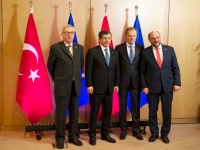Politics
Europe close doors to illegal refugees
EU leaders pursue an approach to crisis
USPA NEWS -
EU Heads of State and Government met with Turkish Prime Minister, Ahmet DavutoÄŸlu, to agree ambitious steps that will significantly limit the flow of irregular migrants to the EU. Also agreed the Commission's new Roadmap back to a fully functioning Schengen area free of internal border controls.
An agreement in principle was reached with Turkey that it will accept the rapid return of all irregular migrants crossing from Turkey into Greece and take back all irregular migrants apprehended on Turkish waters. It was also agreed that Turkey will readmit Syrian nationals returned from the Greek islands under the logic that they can apply for asylum in Turkey and under the understanding that for every Syrian readmitted, one will be resettled to the EU directly from Turkey.
Speaking after the meeting, President Juncker said: "This is a real game-changer. And this is a good deal because it is beneficial in more than one respect. By doing what we are intending to do, we will break the business model of smugglers exploiting human misery and make clear that the only viable way to come to Europe is through legal channels." Recalling the Commission's efforts to provide a coordinated European response to the crisis, the President underlined that "resettlement directly from Turkey is precisely the objective of our work for months. And it will relieve some of the pressure from Greece, helping to address the humanitarian crisis that is quickly developing."
Turkey refugee facility
As part of its commitment to Turkey, the European Union has already mobilized 3 billion Euros for a Turkey Refugee Facility. Under the new plans, the EU will ensure the funding of a first set of projects before the end of March, and also decide on additional funding for the Facility. Last week, the Facility ““ together with the EU's Syria Trust Fund ““ launched projects worth 95 million Euros to provide education to 110,000 Syrian children living in Turkey.
The EU agreed to accelerate work on Turkey's visa liberalization roadmap with a view to lifting the visa requirements for Turkish citizens at the latest by the end of June 2016. President Juncker underlined the Commission's central role in ensuring that Turkey fully respects its commitments: "It will be done, but without changing the standards and the benchmarks we agreed upon." The EU agreed to prepare the decision on the opening of new chapters in Turkey's accession negotiations as soon as possible. This follows on from the conclusions of the October 2015 European Council.
EU leaders will meet again next week at the March European Council to finalize the plan. As President Juncker stated after yesterday's meeting: "What we agreed upon in principle is a good option and it is legally feasible, but it needs more discussion on how concretely to organize the resettlement. We thus agreed on the principles and the European Council will finalise the details in 10 days from now."
EU leaders also welcomed the Commission's new Schengen Roadmap. "Part of the European solution is restoring, in a concerted manner, the normal functioning of the Schengen area, with full support for Member States which face difficult circumstances," said President Juncker. "I am happy that the leaders backed the Communication of the Commission concerning the 'Back to Schengen Roadmap'. That is important, because it clearly demonstrates our willingness to ensure that internal border controls will be lifted at the latest by the end of this year. We made it clear that unilateral actions provide no solutions."
EU leaders agreed to ensure that all Member States fully apply the Schengen Borders Code, and end the 'wave-through' approach, which had seen Member States allow unidentified and unregistered migrants to pass through their territory. EU leaders recognized that to make the Roadmap possible, further support to frontline Member States was critical. They agreed to "stand by Greece in this difficult moment," and welcomed the Commission's proposal, launched last week, to provide emergency support within the EU. They called on the Council to adopt the new scheme before next week's March European Council.
Liability for this article lies with the author, who also holds the copyright. Editorial content from USPA may be quoted on other websites as long as the quote comprises no more than 5% of the entire text, is marked as such and the source is named (via hyperlink).






